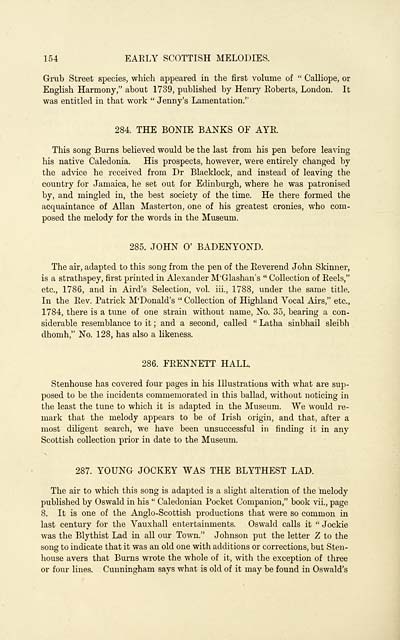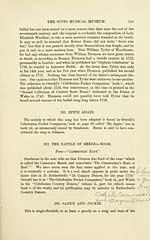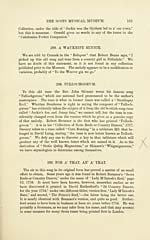Inglis Collection of printed music > Printed text > Early Scottish melodies
(176) Page 154 - Bonie banks of Ayr
Download files
Complete book:
Individual page:
Thumbnail gallery: Grid view | List view

154 EARLY SCOTTISH MELODIES.
Grub Street species, which appeared in the first volume of " Calliope, or
English Harmony," about 1739, published by Henry Roberts, London. It
was entitled in that work " Jenny's Lamentation."
284. THE BONIE BANKS OF AYR.
This song Burns believed would be the last from his pen before leaving
his native Caledonia. His prospects, however, were entirely changed by
the advice he received from Dr Blacklock, and instead of leaving the
country for Jamaica, he set out for Edinburgh, where he was patronised
by, and mingled in, the best society of the time. He there formed the
acquaintance of Allan Masterton, one of his greatest cronies, who com-
posed the melody for the words in the Museum.
285. JOHN 0' BADENYOND.
The air, adapted to this song from the pen of the Reverend John Skinner,
is a strathspey, first printed in Alexander M'Glashan's " Collection of Reels,"
etc., 1786, and in Aird's Selection, vol. hi., 1788, under the same title.
In the Rev. Patrick M'Donald's " Collection of Highland Vocal Airs," etc.,
1784, there is a tune of one strain without name, No. 35, bearing a con-
siderable resemblance to it ; and a second, called " Latha sinbhail sleibh
dhomh," No. 128, has also a likeness.
286. FRENNETT HALL.
Stenhouse has covered four pages in his Illustrations with what are sup-
posed to be the incidents commemorated in this ballad, without noticing in
the least the tune to which it is adapted in the Museum. We would re-
mark that the melody appears to be of Irish origin, and that, after a
most diligent search, we have been unsuccessful in finding it in any
Scottish collection prior in date to the Museum.
287. YOUNG JOCKEY WAS THE BLYTHEST LAD.
The air to which this song is adapted is a slight alteration of the melody
published by Oswald in his " Caledonian Pocket Companion," book vii., page
8. It is one of the Anglo-Scottish productions that were so common in
last century for the Vauxhall entertainments. Oswald calls it " Jockie
was the Blythist Lad in all our Town." Johnson put the letter Z to the
song to indicate that it was an old one with additions or corrections, but Sten-
house avers that Burns wrote the whole of it, with the exception of three
or four lines. Cunningham says what is old of it may be found in Oswald's
Grub Street species, which appeared in the first volume of " Calliope, or
English Harmony," about 1739, published by Henry Roberts, London. It
was entitled in that work " Jenny's Lamentation."
284. THE BONIE BANKS OF AYR.
This song Burns believed would be the last from his pen before leaving
his native Caledonia. His prospects, however, were entirely changed by
the advice he received from Dr Blacklock, and instead of leaving the
country for Jamaica, he set out for Edinburgh, where he was patronised
by, and mingled in, the best society of the time. He there formed the
acquaintance of Allan Masterton, one of his greatest cronies, who com-
posed the melody for the words in the Museum.
285. JOHN 0' BADENYOND.
The air, adapted to this song from the pen of the Reverend John Skinner,
is a strathspey, first printed in Alexander M'Glashan's " Collection of Reels,"
etc., 1786, and in Aird's Selection, vol. hi., 1788, under the same title.
In the Rev. Patrick M'Donald's " Collection of Highland Vocal Airs," etc.,
1784, there is a tune of one strain without name, No. 35, bearing a con-
siderable resemblance to it ; and a second, called " Latha sinbhail sleibh
dhomh," No. 128, has also a likeness.
286. FRENNETT HALL.
Stenhouse has covered four pages in his Illustrations with what are sup-
posed to be the incidents commemorated in this ballad, without noticing in
the least the tune to which it is adapted in the Museum. We would re-
mark that the melody appears to be of Irish origin, and that, after a
most diligent search, we have been unsuccessful in finding it in any
Scottish collection prior in date to the Museum.
287. YOUNG JOCKEY WAS THE BLYTHEST LAD.
The air to which this song is adapted is a slight alteration of the melody
published by Oswald in his " Caledonian Pocket Companion," book vii., page
8. It is one of the Anglo-Scottish productions that were so common in
last century for the Vauxhall entertainments. Oswald calls it " Jockie
was the Blythist Lad in all our Town." Johnson put the letter Z to the
song to indicate that it was an old one with additions or corrections, but Sten-
house avers that Burns wrote the whole of it, with the exception of three
or four lines. Cunningham says what is old of it may be found in Oswald's
Set display mode to: Large image | Transcription
Images and transcriptions on this page, including medium image downloads, may be used under the Creative Commons Attribution 4.0 International Licence unless otherwise stated. ![]()
| Special collections of printed music > Inglis Collection of printed music > Printed text > Early Scottish melodies > (176) Page 154 - Bonie banks of Ayr |
|---|
| Permanent URL | https://digital.nls.uk/94645384 |
|---|---|
| Description | Also: John o' Badenyond. Also: Frennett hall. Also: Young Jockey was the blythest lad. |
| Description | Scottish and English songs, military music and keyboard music of the 18th and 19th centuries. These items are from the collection of Alexander Wood Inglis of Glencorse (1854 to 1929). Also includes a few manuscripts, some treatises and other books on the subject. |
|---|
| Description | The Glen Collection and the Inglis Collection represent mainly 18th and 19th century Scottish music, including Scottish songs. The collections of Berlioz and Verdi collected by bibliographer Cecil Hopkinson contain contemporary and later editions of the works of the two composers Berlioz and Verdi. |
|---|

